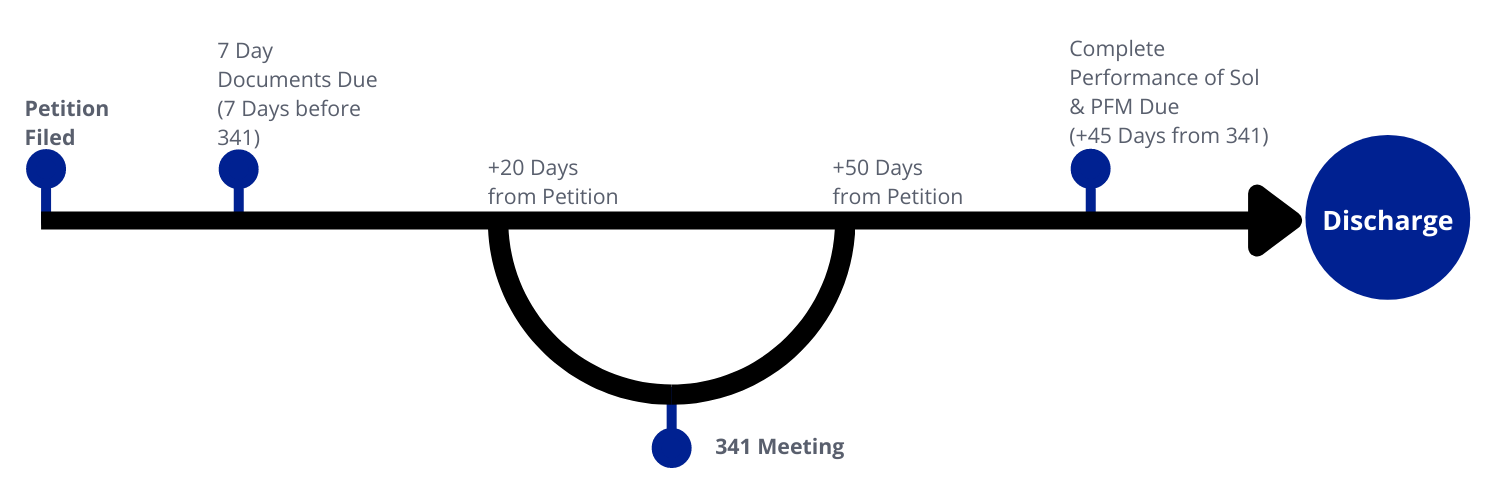Chapter 7 bankruptcy forgives most unsecured debt (like credit cards, signature loans, and medical bills.) This type of bankruptcy is an effective tool for financial breakthrough.
Chapter 7 bankruptcy is the fastest, cheapest type of bankruptcy. In most cases, you will not lose any property. You must qualify to file Chapter 7 bankruptcy. The process takes about 90 days from when you file. Bankruptcy ends the stress of creditor harassment and unpaid bills. You are able to begin rebuilding your credit score and your life.
How Does Chapter 7 Bankruptcy Help?
- Wipes the debt slate clean
- Forgives signature loans, credit cards, medical bills, repos, or foreclosures
- Stabilizes credit and gives clean foundation to rebuild credit score
Steps to Financial Restoration Through Chapter 7 Bankruptcy
Chapter 7 Bankruptcy Video
Timeline of a Chapter 7 Case

Ready to find out whether bankruptcy can help you?
Complete our free, online debt evaluation form or call/text our office at (903) 759-5922. You can also email Carol@CrossStone.com. Find out if bankruptcy is your best option and whether it will help you.
Need More Answers First?
Will I lose my home, cars, 401k, or other property?
You should be able to keep your home, cars, 401k, and other property. One of the biggest bankruptcy myths is that you lose your home and other stuff when you file bankruptcy. If any of your property may be lost, we will let you know. Learn more about what you can do about property.
How much does Chapter 7 cost?
The cost of this bankruptcy depends on how complex your case will be. The filing fee is $338. The average Chapter 7 attorney fee is about $1800. Learn more about how fees are charged and what makes a case complicated.
How does chapter 7 affect my credit score? How soon after Chapter 7 can I buy a home or car?
This bankruptcy can be reported on your credit report for up to 10 years. This does NOT mean you can’t buy a home or car or get new credit for 10 years. There are waiting periods to buy a home of around two years. For a car, right now, most people are able to buy a car right after the bankruptcy is over. More factors than just the filing of bankruptcy determine whether you qualify. Read more about the impact of bankruptcy on future financing.
What debts can be forgiven (discharged) in Chapter 7?
Most unsecured debts, such as credit cards, lines of credit, signature loans, and medical bills are forgiven with Chapter 7. For secured debt, such as your home or vehicles, if you want to keep the item, you do have to continue to pay according to the contract. Read more detailed information about what debts can be discharged in Chapter 7 bankruptcy.
What are the pros and cons of Chapter 7?
Chapter 7 is generally the cheapest, fastest bankruptcy. What it does well is forgive unsecured debt, such as credit cards, signature loans, and deficiencies on car loans where you had to give up the vehicle. Chapter 13 does everything a Chapter 7 does and more. Chapter 13 also costs much more and takes longer. Choosing which bankruptcy is best for you is an important decision. Read more on the pros and cons of Chapter 7 bankruptcy.
I may need to file Chapter 7 bankruptcy, but am not sure yet. What do I need to do now?
If you are considering bankruptcy, but are not sure, you still need to know what to do and not do. The bankruptcy rules are not necessarily common sense. To learn more about what to do or not do before filing, read planning for bankruptcy – do’s and don’ts.
Additional Reading
For more information on Chapter 7, see our blog posts on the topic.